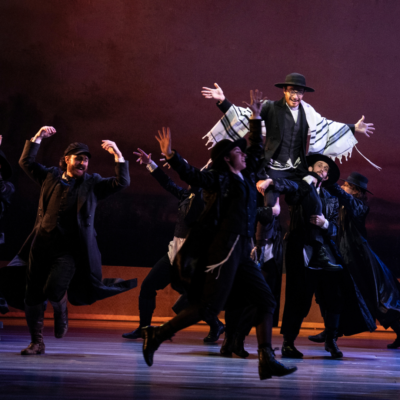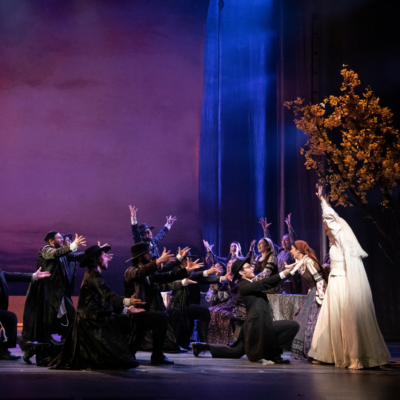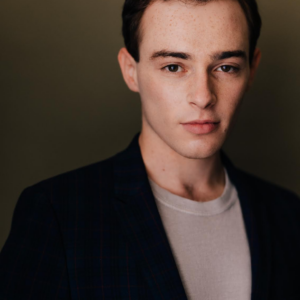“Golde, darling, I had to see you before I left because I have such news for you,” Yente, the matchmaker, says to Golde, placing a basket of apples on a wooden table. Golde looks at me, rolling her eyes. The matchmaker always has news for us. Yente goes on, “All my life I’ve dreamed of going to one place and now I’ll walk, I’ll crawl, I’ll get there. Every year at Passover what do we say? Next year in Jerusalem. Next year in the Holy Land.”
“You’re going to the Holy Land?” Golde asks, standing up. We both know Yente is too frail to survive such a journey with nothing but the clothes on her back. But she isn’t shaken.
“And you know why? In my sleep, my husband, my Aaron, came to me and said: Yente, go to the Holy Land. So, somehow or other,” Yente continues, walking off to face the wilderness, “I’ll get to the Holy Land.”
I grab the edge of my cart, uncomfortable, which isn’t in the script. But this line never sat right with me. The whole scene didn’t. It was supposed to be 1905, a time of kopeks and shmatas and news spread on horseback, but mention of the Holy Land snaps me back to the odious present. Bit by bit, the edge of the stage becomes clearer. The lights seem more artificial. Until finally, I am no longer Motel the tailor at all.
I look at Yente. I have the urge to stop her, to convince her to go anywhere else. But Motel does not know what happens to the Holy Land. He does not know what path our people chose to take. So eight times a week, I let Yente go, reckoning with what became of her dream of Zion.
This malaise of mine was a product of the times. I was cast as Motel in the national tour of Fiddler on the Roof in June 2021, just a few weeks after the eruption of a brutal war in Israel-Palestine that left 260 Palestinians and 13 Israelis dead. Conflicts like these had long passed me by unnoticed, reduced by Jewish elders and institutions to a simple clash between “terrorists” and the “righteous” Israeli government. But once I entered college, I learned another story. Through history classes and conversations with friends, I was confronted with the scope of the Israeli government’s violence, the extent of the Palestinian refugee crisis, and the vast disparity in their security and power.
Zionism has dug itself deep into contemporary American Judaism, such that it’s become hard to tell where one begins and the other ends. Our longing for Zion feels pure, baked into Jewish holidays, traditions, and histories. It’s how we are raised. It’s the songs we sing in synagogue. It’s why we say “next year in Jerusalem.” But Zionism is more than just an ancient, religious connection to the land: it is the pursuit of a nationalist Jewish state. In 2021, I watched as this vision of Zion played out and invoked ancient values in the name of something ugly, something that invaded mosques and burned homes and bombed residential buildings.
So I began speaking out, posting on social media and engaging in conversations with Jews and non-Jews alike. I wanted the people – specifically the Jewish people – in my life to see the conflict how I saw it, to separate the state of Israel from the ancient land it was on and the religion it protected.
But as I criticized Zionism and advocated for Palestinian rights, I found myself at the pointy end of a Jewish pitchfork. Not only did other Jewish people disagree with me, but they saw something wrong with me, too. To some, my activism was hate speech. To others, it was antisemitism or proof that I was a “self-hating Jew.” These reactions were alarming, because by framing my politics as incompatible with my Judaism, other Jews had twisted what it means to be Jewish. In centering a commitment to Israel over anything else, Zionists had redefined Judaism and pushed me outside of it. As if overnight, the Jewish spaces I had known all my life seemed to have no room for me. And worse than that, it felt that Judaism itself had no room for me, either.
Right at this moment when I felt the least aligned with Judaism, I was cast in the most Jewish musical in existence. Written in 1964, Fiddler on the Roof has taken on a life of its own, occupying a permanent spot in any synagogue’s DVD collection. And it’s clear why. Not only is Fiddler’s music catchy and story compelling, but it is also one of the few representations of shtetl history. Telling the story of Tevye, a Jewish dairyman living in a shtetl in Russia in 1905, Fiddler does not shy away from displaying long-standing Jewish traditions, ceremonies, and thought patterns. Because of this, Fiddler has become a chance for Ashkenazi Jews to imagine the lives of our ancestors, to draw a straight line between the past and present. That has been crucial for my own Jewish identity, because like many of my Jewish friends, I don’t know how most of my ancestors lived before immigrating to America or why they came. So in a way, the story of Fiddler has become their story, too. It has transcended fiction and become more like history, a myth that feels too personal to be fiction.
Fiddler’s excellence has not only cemented it as a staple of Jewish culture, but also as a window into Jewish life for many non-Jews. Fiddler became the first musical to reach 3,000 performances on Broadway, and tens of millions of people have engaged with it since then. It has been made into an Oscar-winning film, revived five times on Broadway and five times on the West End, translated into Yiddish, Hebrew, Japanese, German, and French, and toured all around the world.
So by performing in Fiddler, it felt like I was signing up to be a Jewish ambassador, a mascot of the faith that even the faith did not seem to want. Thinking about that swelled nerves, and so did thinking about joining a company of Jewish actors. I didn’t know what they’d think of me, or how I’d feel engaging with Jewish themes that my politics (supposedly) opposed. So when rehearsals began, I decided to throw myself into the world of Fiddler, hoping it would distract me from the discomforts of the real world.
Theatre has always been an escape of mine, but it was particularly easy to get lost in the shtetl of Anatevka. The script is a particularly exemplary one, so layered with wit and heart and musicality. But it was more than that. Fiddler was a feeling, that sweet whiff of nostalgia. It brought back memories of Hebrew school mornings, of dinners at my grandparent’s house, of challah and Kedem, of shabbos nights at summer camp and cookies at kiddush luncheons. It was an escape, a chance to go back in time, to live amongst my ancestors and be reacquainted with their struggles.
And their struggles were grand. At the end of the musical, the Jewish people of Anatevka are kicked out of their homes for seemingly no reason at all, given three days to pack up everything they own. And though the Russian Constable says he “does not know why” the Jews must leave, anyone watching knows precisely why: because of their identity, their difference. While the real history varies slightly from the musical, Jews living in shtetls at the turn of the 20th century truly faced widespread antisemitism and violent pogroms. After enduring such persecution, it is clear why these Jews dreamed of a place where they could finally feel safe. But in 2023, as I watch the IDF (Israeli Defense Forces) invade the Al-Aqsa mosque, beating worshippers and frightening children, it is clear that their dream has gone awry. Every day I am forced to see our people on the other side of the power dynamic that Fiddler warns us about, inflicting the same conditions we once had to endure onto Palestinians. And that’s hard. It’s hard to see a “Jewish state,” and Judaism itself, associated with occupation and war and discrimination, because like every Jew, I know the flavor of bigotry all too well. As Fiddler reminds us, it wasn’t too long ago that we were the subject of such persecution.
How quickly we have forgotten.
In that way, Fiddler resolved my feelings of internal displacement. Eight times a week, on stages across the country, I got to immerse myself in traditions through song, misquoted Torah excerpts, shabbos prayers and candles, weddings and chuppahs and bottle dancers and bickering. I got to honor my ancestors’ memories, donning their clothes and reciting their prayers. Even as the endless violence in Israel brought on feelings of shame, Fiddler brought on feelings of pride: pride in our culture, pride in our values, pride in our history. Because that history reminds us of the importance of standing by the persecuted, whether they look like us or not. It reminds us to thread our community together, rather than rip its seams apart. It reminds us to live our fullest lives as Jewish people, but not at the expense of others.
To me, that is precisely what being Jewish means. That is our tradition. That is what keeps the Fiddler from falling off his roof.
And it was Yente, surprisingly, who reminded me of that.
“I’ll get to the Holy Land,” she promises me as she leaves the stage, lifting a single, crooked finger. She smiles at the sky. “And then, when I’m laid to rest, I can lie with the matriarchs Sarah, Rebekah, and Rachel….”
Then she pauses, thinking for just a moment, before she shrugs, charting a new course forward for us all.
“…if there’s room.”
Photo credits: Joan Marcus — North American Tour of Fiddler on the Roof



